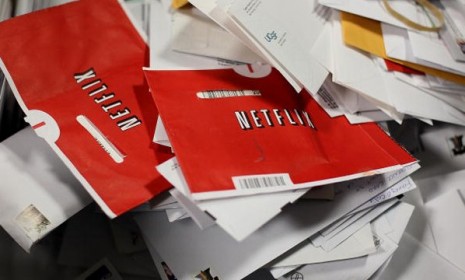Is Netflix the next HBO?
Netflix may be on the verge of acquiring its own (expensive) TV series in its first stab at original programming. How worried should traditional networks be?

A free daily email with the biggest news stories of the day – and the best features from TheWeek.com
You are now subscribed
Your newsletter sign-up was successful
On Tuesday, Deadline.com reported that Netflix had outbid HBO and other television networks to buy "House of Cards," a new one-hour drama series developed by Kevin Spacey and The Social Network auteur David Fincher. If successful, the deal would mark a major first for Netflix: It would own the rights to a show instead of streaming and otherwise distributing programs and movies controlled by others. The deal is also notable for its scope: Netflix surprised observers by reportedly committing $100 million to two seasons (26 episodes). How will the company's bold move alter the television business?
This changes everything: "In one fell swoop, the streaming giant not only picked up a marquee series…but also upended the way television deals are made," says Kyle Buchanan at New York. It's unprecedented for any network, much less a company that has never created an original program, to give such an extended commitment to a new project. This is a "landmark move" that heralds a future where the internet, not television, will be the dominant form of mass entertainment.
"Meet your new network: Netflix to buy Kevin Spacey drama"
The Week
Escape your echo chamber. Get the facts behind the news, plus analysis from multiple perspectives.

Sign up for The Week's Free Newsletters
From our morning news briefing to a weekly Good News Newsletter, get the best of The Week delivered directly to your inbox.
From our morning news briefing to a weekly Good News Newsletter, get the best of The Week delivered directly to your inbox.
Netflix is now an even bigger player: Some see Netflix as simply a "place to watch favorite old movies and shows on a continual loop," says Alan Sepinwall at HitFix. Producing its own shows, though, would make Netflix more like HBO in its Sopranos-fueled glory days — "a rich, restraint-free platform that doesn't have to play by the rules of traditional television." A successful deal would also lead to "fascinating possibilites" for other shows to be "made and successfully marketed outside traditional means."
"Will Netflix cutting out the middle man lead more viewers to cut the cord?"
Failure is an option, too: "Getting into the business of betting on television shows is... a highly risky one for Netflix," say Ethan Smith and Nick Wingfield in The Wall Street Journal. So far, the company has been successful mostly by "focusing on its areas of expertise," which do not include producing TV shows. Netflix has tried to expand its reach before, most notably when it opened a separate unit to acquire DVD rights at film festivals. That division was eventually closed.
"Netflix in talks to distribute original series"
A free daily email with the biggest news stories of the day – and the best features from TheWeek.com
-
 Political cartoons for February 21
Political cartoons for February 21Cartoons Saturday’s political cartoons include consequences, secrets, and more
-
 Crisis in Cuba: a ‘golden opportunity’ for Washington?
Crisis in Cuba: a ‘golden opportunity’ for Washington?Talking Point The Trump administration is applying the pressure, and with Latin America swinging to the right, Havana is becoming more ‘politically isolated’
-
 5 thoroughly redacted cartoons about Pam Bondi protecting predators
5 thoroughly redacted cartoons about Pam Bondi protecting predatorsCartoons Artists take on the real victim, types of protection, and more